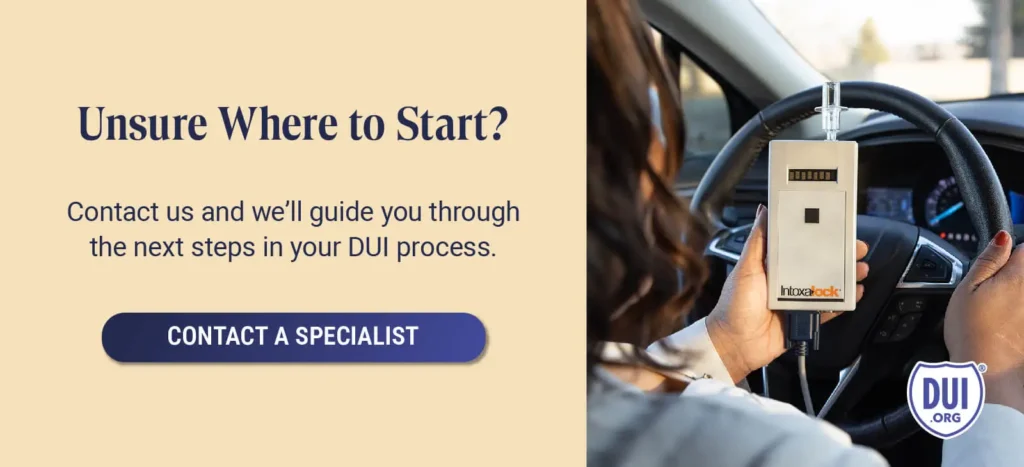
Understanding the relationship between a DUI and employment can help you address it and rebuild trust with employers.
Facing a misdemeanor DUI can be unsettling, especially when you’re unsure how it might affect your job or future opportunities. Questions about DUI and employment are common. Whether you’re worried about background checks, interview questions, or your rights as a candidate, you’re not alone.
This guide explains exactly how a misdemeanor DUI can influence your employment prospects and gives you practical steps to protect your career and move forward with confidence.
This blog is intended for informational purposes only. For legal advice on your DUI journey, consult an experienced attorney.
Can a Misdemeanor DUI Affect Your Employment Background Check?
Yes, a misdemeanor DUI almost always appears on your background check and can impact your job prospects, especially if you’re applying for a role that involves driving or operating machinery. Most employers conduct criminal background checks, and a DUI conviction typically shows up for seven to 10 years or longer, depending on your state’s laws. If you’re seeking a position that requires a clean driving record, such as commercial driving or roles in education, healthcare, public safety, or government, your DUI may carry even more weight.
Employers are required by the Fair Credit Reporting Act (FCRA) to notify you if they intend to run a background check and must get your written permission first. In most cases, they’ll also ask you to disclose any criminal convictions, including misdemeanors, before running your record. Failing to disclose a DUI when asked can disqualify you from the hiring process.
If you have questions about the DUI process, contact DUI.org for assistance. We can help support you through the next steps.
Understanding How DUI Classifications Vary by Jurisdiction
Most first-time DUIs are classified as misdemeanors, but the specifics vary by state and situation. Your DUI could be classified differently based on:
- Prior convictions
- The severity of the incident
- Whether injuries or property damage occurred
How a DUI appears on your background check also depends on your state’s reporting laws and practices. For example, some states treat a DUI as a criminal offense, while others may classify it as a traffic violation.
Always check your state’s guidelines or consult a DUI attorney for details.
Know Your Rights with a DUI on Record
You have rights concerning how employers use your criminal history in hiring decisions. The Equal Employment Opportunity Commission (EEOC) discourages employers from implementing blanket bans on applicants with criminal records, including DUIs.
Employers are encouraged to consider:
- Nature of the Offense: Is the DUI relevant to the job responsibilities?
- Time Elapsed: How long ago did the conviction happen?
- Rehabilitation Efforts: Have you completed education, treatment, or DUI rehabilitation programs?
Many states and cities have enacted "ban-the-box" laws that prohibit employers from asking about criminal history on initial job applications. These laws aim to ensure that candidates are first evaluated based on their qualifications.
If you have questions about your rights or how to handle a DUI on your record, consider reaching out to a DUI attorney who can provide guidance based on your specific situation.

Options for Expunging or Sealing a DUI Record
Expunging or sealing your DUI record can remove or hide it from most public background checks, making it easier to pass screenings and expand your employment opportunities.
Eligibility and process vary by state:
- Expungement completely erases the DUI from your criminal record, allowing you to legally state you’ve never been convicted in most cases.
- Sealing hides the record from public view but may still allow law enforcement or certain agencies to access it.
Consult a DUI attorney to explore your expungement or sealing options, as requirements and waiting periods differ by state. If you’re not eligible for expungement, you may still be able to seal your record or pursue other remedies.
Preparing for Interviews with a DUI on Your Record
If you can’t expunge or seal your DUI, you’ll need to address it honestly and professionally in interviews. Here are some suggestions on how to handle the conversation:
Be Honest
Be truthful when asked about your criminal history. Employers will likely find out anyway during a background check.
Frame the Incident as a Lesson
Briefly explain the circumstances, take responsibility, and share what you’ve learned or how you’ve changed since the incident.
Emphasize Your Qualifications
Highlight your skills, experience, and any steps you've taken to address the issue, such as completing alcohol education or counseling.
Provide Strong References
Letters of recommendation can help offset concerns about your DUI and demonstrate your reliability and work ethic.
Overcoming the Employment Impact of a DUI
A misdemeanor DUI can affect employment, but it doesn't have to derail your career. By understanding the relationship between a DUI and employment, you can take steps to address it and rebuild trust with employers.
Here’s what you can do:
- Seek legal advice to explore expungement or sealing.
- Use available DUI resources to support your job search and compliance.
- Stay current with all legal requirements such as installing an ignition interlock device, like Intoxalock.
- Avoid repeat offenses, as multiple DUIs carry much more severe consequences.
- Focus on demonstrating accountability, growth, and a commitment to making better choices.
Frequently Asked Questions About Misdemeanor DUIs and Employment
How Long will a Misdemeanor DUI Affect Employment?
A misdemeanor DUI can affect employment for several years, depending on state laws, the nature of the job, and how employers handle background checks. In most states, a misdemeanor DUI remains on your criminal record and driving history for 7 to 10 years, though it may be visible longer in certain background checks.
Will a Dismissed DUI Show Up on a Background Check?
Yes, a dismissed DUI can still show up on a background check. Even if the charge didn’t result in a conviction, the arrest record and court documentation may still be accessible in public records, depending on your state’s laws and the type of background check conducted.
Can a Misdemeanor DUI Affect a Job Offer?
Yes, a misdemeanor DUI can affect a job offer, especially if the offer is contingent on passing a background check. Many employers include criminal background screenings as part of the final hiring steps. If a DUI appears and hasn’t been disclosed, the offer may be rescinded.
Will a DUI Disqualify Me from Getting a Job?
A DUI won’t automatically disqualify you from getting a job, but it can limit your options, depending on the industry, the nature of the role, and how long ago the offense occurred.
Moving Forward After a DUI
Facing a misdemeanor DUI can be challenging, especially given the DUI financial impact, but you can overcome its impact on your employment with the right approach and support.
If you need help navigating ignition interlock requirements, obtaining a restricted license, and SR-22 insurance requirements after a DUI, our specialists at DUI.org are here to assist you with these steps. Call us today at (877) 246-7808 to get started!
Get support.
What is next? We can help you through the process. Give us a little information and we can support you through the next steps.
All fields are required.